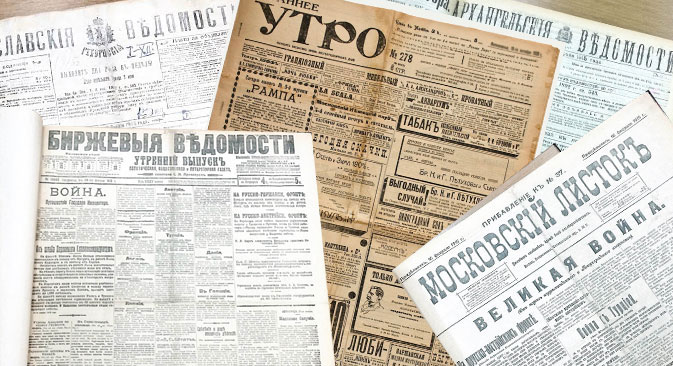
RBTH turns the clock back a century. Collage by RBTH
Yaroslavskie Gubernskie Vedomosti (“Yaroslavl Government Gazette”), February 23, 1915
The swift concentration and then rapid, Suvorov-like advance of our brave army to the Dniestr River and Lvov, and the victories near Gnilaya Lipa, have saved our Podoliya and Volhiniya [historical regions of Eastern Europe straddling Poland, Ukraine, and Belarus – RBTH]from the horrors of war and devastation and have transferred the theater of military operations to Galicia [a historical region that currently straddles the border between Poland and Ukraine – RBTH], to our ancient Galicia, which has for 600 years already been awaiting its liberation from the foreign yoke, and which has staunchly defended and preserved its Russian traditions and its native faith.
When mobilization was just beginning in Red Russia, there were arrests of thousands and executions of hundreds of priests, intellectuals and peasants. In a word, of all of those, who had own themselves to be the most significant upholders of the Russian national idea. The enemies of the Russian people sought to use the state of martial law to exterminate with vulgar force that Russian consciousness with which they were powerless to fight in the cultural field.
<…> How many widows and orphans now remain, who have lost, because of their fidelity, fathers and husbands of our common Mother Russia!..
We cannot leave them without our heartfelt participation and without help in the provision of bread, clothes and fuel. <…> We ask for donations to be sent to Lvov to the name of the General Governor’s Central Charity Committee. <…>
We ask all newspapers to publish this address several times.
Central Charity Committee in Lvov
Kievskaya Mysl’ (“Kiev Thought”), February 25, 1915
A student of the Zilberman Commercial Institute, who recently poisoned himself at 72 Fundukleyev Street (allegedly because of an apparent rejection by his bride), has died in hospital. Z. was buried by his fellows on March 10. According to his companions, the inexperienced 19-year-old student made the acquaintance of a 32-year-old woman.
The young man fell into a kind of trap; with no understanding of such a way of life, Z. came into conflict with a group of young people. After the burden of all his prior suffering, this was the last straw.
Z. could not withstand it and poisoned himself with those calomel [mercurous chloride – RBTH] tablets which had been supplied to him precisely by his “bride.” The correspondence and other materials that revealed the drama have been handed over to the investigation authorities by the father of Z, following his arrival in Kiev.
Arkhangelskie Gubernskie Vedomosti (“Arkhangelsk Government Gazette”), February 26, 1915
The obligatory decree on the order to maintain the cleanness and repair of the streets, squares, boarding, sidewalks, sewer pipes, draw-wells, ditches and ponds, published for residents of Arkhangelsk in 1907, is now, according to the decree of the Arkhangelsk city Duma from December 1 with my confirmation, changing in the following way:
In winter the sidewalks must be cleaned of the snow by 9 a.m. If the sidewalks are slippery, they should be strewn with sand or sawdust. In Solombala, as well as in the 1st and 2nd districts of the city, starting from Novgorodsky Prospekt and up to the Obvodny Canal (and on the transverse streets of the same regions), the sidewalks are permitted to be strewn with sifted cinders instead of sand. The streets should be freed of any ruts and present an even surface.
Russkoye Slovo (“Russian Word”), February 23, 1915
PARIS - Sarah Bernhardt has undergone surgery at Doctor Moore’s clinic in one of the quiet corners of Bordeaux.
The surgeon, famous professor Denucé, arrived at the clinic at 9 a.m., and was assisted by Prof. Arnotsan.
Sarah Bernhardt, who was on the lowest floor, was removed to the operating theater by an elevating machine. Before the operation she read masses of letters and telegrams sent to her from her admirers from all corners of the globe with wishes for a happy outcome.
The surgery was carried out with the strict consent of the patient. Before the operation itself doctors asked Sarah Bernhardt again if she had not had a change of mind.
“No,” she answered in a firm voice.
When her son Maurice approached her, greatly distressed, she replied simply to his “Bon courage!” with the words “Je l`ai, mon cher enfant, adieu!” [“I have it, my dear child, goodbye” – RBTH], then jokingly added: “I’m ready to be sacrificed.”
Sarah Bernhardt was chloroformed. The operation lasted 19 minutes. Her right leg was amputated slightly above the knee. Professor Denucé said to his assistants: “I felt like I was blaspheming and smashing a piece of art.”
When Sarah Bernhardt came around, she showed no visible depression of spirit. She must lie without moving for 21 days. She is in pain but her reports are fully reassuring.
Feb. 17-22: News curiosities selected from the week’s Russian press in 1915
All rights reserved by Rossiyskaya Gazeta.
Subscribe
to our newsletter!
Get the week's best stories straight to your inbox